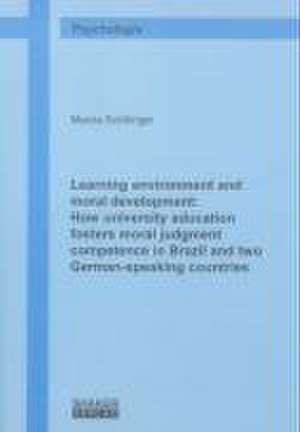Learning environment and moral development: How university education fosters moral judgment competence in Brazil and two German-speaking countries: Berichte Aus Der Psychologie
Autor Marcia Schillingeren Limba Engleză Paperback – 31 aug 2006
Din seria Berichte Aus Der Psychologie
-
 Preț: 150.35 lei
Preț: 150.35 lei -
 Preț: 294.04 lei
Preț: 294.04 lei -
 Preț: 43.88 lei
Preț: 43.88 lei -
 Preț: 157.79 lei
Preț: 157.79 lei -
 Preț: 230.76 lei
Preț: 230.76 lei -
 Preț: 132.37 lei
Preț: 132.37 lei -
 Preț: 185.25 lei
Preț: 185.25 lei -
 Preț: 162.90 lei
Preț: 162.90 lei -
 Preț: 79.43 lei
Preț: 79.43 lei -
 Preț: 310.19 lei
Preț: 310.19 lei -
 Preț: 137.16 lei
Preț: 137.16 lei -
 Preț: 276.39 lei
Preț: 276.39 lei -
 Preț: 278.59 lei
Preț: 278.59 lei -
 Preț: 160.46 lei
Preț: 160.46 lei -
 Preț: 95.84 lei
Preț: 95.84 lei -
 Preț: 281.40 lei
Preț: 281.40 lei -
 Preț: 141.88 lei
Preț: 141.88 lei -
 Preț: 155.74 lei
Preț: 155.74 lei -
 Preț: 279.32 lei
Preț: 279.32 lei -
 Preț: 211.42 lei
Preț: 211.42 lei -
 Preț: 221.53 lei
Preț: 221.53 lei -
 Preț: 156.47 lei
Preț: 156.47 lei -
 Preț: 127.46 lei
Preț: 127.46 lei -
 Preț: 78.99 lei
Preț: 78.99 lei -
 Preț: 156.54 lei
Preț: 156.54 lei -
 Preț: 264.44 lei
Preț: 264.44 lei -
 Preț: 284.61 lei
Preț: 284.61 lei -
 Preț: 294.95 lei
Preț: 294.95 lei -
 Preț: 223.40 lei
Preț: 223.40 lei -
 Preț: 280.17 lei
Preț: 280.17 lei -
 Preț: 140.21 lei
Preț: 140.21 lei -
 Preț: 160.03 lei
Preț: 160.03 lei -
 Preț: 192.74 lei
Preț: 192.74 lei -
 Preț: 285.48 lei
Preț: 285.48 lei -
 Preț: 126.62 lei
Preț: 126.62 lei -
 Preț: 174.43 lei
Preț: 174.43 lei -
 Preț: 83.48 lei
Preț: 83.48 lei -
 Preț: 213.18 lei
Preț: 213.18 lei -
 Preț: 292.16 lei
Preț: 292.16 lei -
 Preț: 164.66 lei
Preț: 164.66 lei -
 Preț: 132.66 lei
Preț: 132.66 lei -
 Preț: 195.26 lei
Preț: 195.26 lei -
 Preț: 263.06 lei
Preț: 263.06 lei -
 Preț: 163.28 lei
Preț: 163.28 lei -
 Preț: 166.34 lei
Preț: 166.34 lei -
 Preț: 189.43 lei
Preț: 189.43 lei -
 Preț: 79.60 lei
Preț: 79.60 lei -
 Preț: 122.28 lei
Preț: 122.28 lei -
 Preț: 116.05 lei
Preț: 116.05 lei
Preț: 278.38 lei
Nou
Puncte Express: 418
Preț estimativ în valută:
53.28€ • 55.42$ • 44.65£
53.28€ • 55.42$ • 44.65£
Carte indisponibilă temporar
Doresc să fiu notificat când acest titlu va fi disponibil:
Se trimite...
Preluare comenzi: 021 569.72.76
Specificații
ISBN-13: 9783832254681
ISBN-10: 3832254684
Pagini: 158
Ilustrații: 11 schwarz-weiße Abbildungen
Greutate: 0.23 kg
Editura: Shaker Verlag
Seria Berichte Aus Der Psychologie
ISBN-10: 3832254684
Pagini: 158
Ilustrații: 11 schwarz-weiße Abbildungen
Greutate: 0.23 kg
Editura: Shaker Verlag
Seria Berichte Aus Der Psychologie
